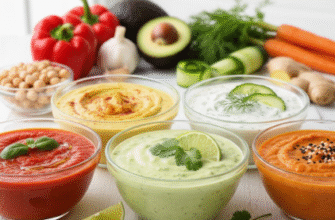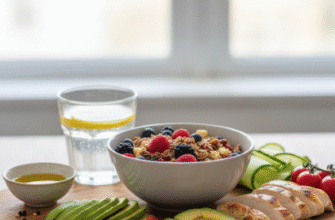Embarking on a journey towards healthier eating often starts with a burst of enthusiasm. We clean out the pantry, stock up on greens, and vow to stick to the plan this time. But somewhere between the initial motivation and the reality of daily life, good intentions can falter. The key isn’t finding the “perfect” diet; it’s discovering a way of eating that nourishes you, feels good, and, crucially, fits seamlessly into your life for the long haul. Sustainability isn’t about rigid rules or deprivation; it’s about building habits that stick.
Shift Your Mindset: Addition Over Subtraction
One of the biggest mental hurdles in healthy eating is focusing entirely on what you *can’t* have. This deprivation mindset can breed resentment and cravings. Instead, try focusing on what you can *add* to your plate. Think about incorporating more colourful vegetables, adding a piece of fruit to your breakfast, choosing whole grains more often, or including lean protein sources at each meal. When you focus on adding nutrient-dense foods, you naturally start to crowd out some of the less beneficial options without feeling like you’re constantly fighting temptation. It’s a more positive and empowering approach that encourages exploration rather than restriction.
Start small. Can you add a handful of spinach to your scrambled eggs? Swap your usual afternoon snack for an apple with peanut butter? Add a side salad to your dinner? These small additions accumulate over time, significantly boosting your nutrient intake and shifting your preferences gradually. This approach feels less like a diet and more like an upgrade to your existing eating patterns.
Embrace the Power of Small, Gradual Changes
Trying to overhaul your entire diet overnight is often a recipe for overwhelm and eventual burnout. Think evolution, not revolution. Lasting change is built on small, manageable steps that become automatic over time. Pick one or two simple changes to focus on each week or two. Maybe it’s swapping sugary drinks for water, switching from white bread to whole wheat, or committing to cooking one extra meal at home each week.
Once that change feels like second nature, introduce another one. This gradual approach allows your taste buds, habits, and routines to adjust without feeling disruptive. It builds confidence with each small success, making you more likely to stick with it. Remember, the goal is progress, not instantaneous perfection. A slow and steady approach might not seem dramatic, but it’s far more likely to lead to sustainable habits that last years, not just weeks.
Examples of Small Steps:
- Drink one extra glass of water each day.
- Add one serving of vegetables to your lunch or dinner.
- Switch from refined grains (white pasta, white rice) to whole grains (whole wheat pasta, brown rice) for one meal per day.
- Replace one processed snack with a piece of fruit or a handful of nuts.
- Cook one more meal at home per week instead of eating out or getting takeaway.
Plan and Prep for Success
Life gets busy. Without a plan, it’s easy to default to convenience foods or takeaway when hunger strikes and time is short. Meal planning and prepping, even in a minimal way, can be game-changers for staying on track. This doesn’t mean you need to spend your entire Sunday cooking intricate meals for the week (unless you enjoy that!).
Simple Planning: Start by just planning your dinners for the week. Look at your schedule, consider nights you’ll be short on time, and choose meals accordingly. Write down a grocery list based on your plan. Knowing what you’re going to eat eliminates daily decision fatigue.
Basic Prep: Even small amounts of prep can make a huge difference.
- Wash and chop vegetables when you get home from the store, so they’re ready to toss into salads, stir-fries, or roast.
- Cook a batch of whole grains like quinoa or brown rice to use throughout the week.
- Hard-boil some eggs for quick snacks or additions to salads.
- Portion out nuts or seeds into grab-and-go snack bags.
- Marinate chicken or fish so it’s ready to cook quickly.
Having these components ready makes assembling healthy meals much faster and less daunting during hectic weekdays. It removes barriers and makes the healthy choice the easy choice.
Important Consideration: Striving for absolute dietary perfection often leads to burnout and giving up entirely. Sustainable healthy eating embraces flexibility and acknowledges that occasional deviations are normal and okay. Don’t let one less-than-ideal meal or day derail your long-term progress towards better habits.
Make Healthy Choices Convenient
Environment shapes behaviour. If your kitchen is stocked primarily with processed snacks and sugary treats, that’s likely what you’ll reach for. Conversely, if healthy options are visible and accessible, you’re more likely to choose them. Take stock of your kitchen environment.
Keep a fruit bowl on the counter. Store washed and cut vegetables at eye level in the fridge. Keep healthy staples like oats, lentils, canned beans, nuts, seeds, and whole grains readily available in your pantry. Pre-portion healthy snacks. When healthy food is easy to see and grab, it requires less willpower to make a good choice, especially when you’re tired or stressed.
Think about convenience beyond your kitchen too. Pack healthy snacks for work or when you’re on the go. Identify healthy options at restaurants you frequent. Making the healthy choice the path of least resistance is a powerful strategy for long-term success.
Tune In: Listen to Your Body’s Signals
Diets often impose external rules about *what*, *when*, and *how much* to eat, encouraging us to ignore our own internal hunger and fullness cues. Sustainable healthy eating involves reconnecting with these signals. Pay attention to physical hunger – is your stomach growling? Do you feel low energy? Learn to differentiate this from emotional eating triggered by boredom, stress, or sadness.
Similarly, practice recognizing fullness. Eat slowly, savour your food, and pause during meals to assess how you feel. You don’t always need to clean your plate. Learning to stop when you are comfortably satisfied, rather than overly full, is a key skill for managing portions naturally and developing a healthier relationship with food. This practice, often called mindful eating, takes time but fosters a more intuitive and less restrictive approach.
Flexibility Trumps Rigidity: The 80/20 Guideline
Life includes celebrations, holidays, social events, and times when you just fancy a treat. A sustainable approach to healthy eating allows for these moments without guilt or feeling like you’ve failed. Aiming for 100% adherence all the time is unrealistic and often leads to an “all-or-nothing” mentality, where one slip-up causes you to abandon your efforts entirely.
Many find success with an 80/20 guideline: focus on making nourishing choices about 80% of the time, and allow for flexibility and enjoyment of less nutrient-dense foods the other 20%. This isn’t a strict mathematical formula but rather a mindset that embraces balance. It acknowledges that healthy eating is part of a larger, enjoyable life, not the sole focus of it. This flexibility prevents feelings of deprivation and makes the overall pattern sustainable.
Find the Joy in Healthy Food
Healthy eating shouldn’t feel like a chore or a punishment. If you’re forcing yourself to eat foods you genuinely dislike, it won’t last. The world of nutritious food is incredibly diverse and flavourful! Explore new recipes, try different cooking methods (roasting vegetables brings out their sweetness, for example), and experiment with herbs and spices instead of relying solely on salt or heavy sauces.
Visit a farmers’ market for fresh, seasonal produce. Try a new type of grain or legume. Involve family or friends in cooking. When you find healthy foods and preparation methods you truly enjoy, choosing them becomes natural and desirable, not an obligation. Focus on creating delicious, satisfying meals that also happen to be good for you.
Don’t Forget Hydration
Sometimes, thirst can be mistaken for hunger. Staying adequately hydrated is crucial for overall health, energy levels, and digestion. Before reaching for a snack, try drinking a glass of water and waiting a few minutes to see if the feeling passes.
Keep a water bottle handy throughout the day as a visual reminder to drink up. Water is the best choice, but unsweetened herbal teas also contribute to your fluid intake. Reducing sugary drinks like sodas, juices, and sweetened coffees is often one of the simplest yet most impactful changes you can make for your overall health.
Reflect, Adjust, and Be Patient
What works for you now might need tweaking later on. Life circumstances change, schedules shift, and preferences evolve. Regularly check in with yourself. How are you feeling? Are your current habits working for you? Are there any challenges you’re consistently facing?
Don’t be afraid to adjust your approach. Maybe the meal prep strategy you started with is too time-consuming now, and you need a simpler version. Perhaps you’ve discovered you really enjoy a particular type of exercise and need to adjust your meals to support your energy levels. Sustainable eating is a dynamic process, not a fixed destination. Be patient with yourself, celebrate your progress (no matter how small), and keep learning and adapting. Building lasting habits takes time, consistency, and a commitment to finding what truly works for *you*.








